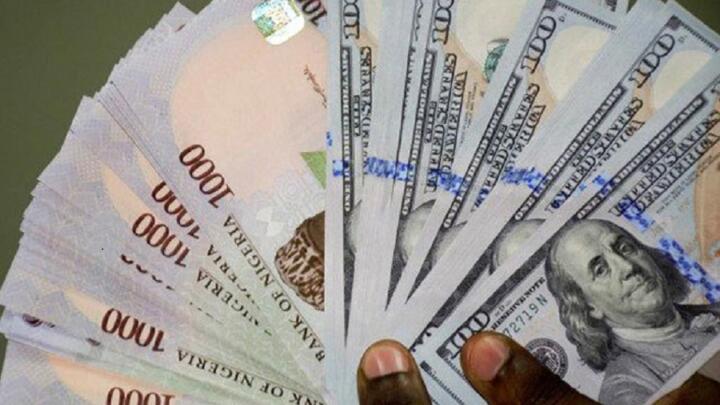The Nigerian naira began the new trading week on a weaker footing, exchanging at ₦1,533 per United States dollar at the official foreign exchange window. The development underscores persistent volatility in the foreign exchange market despite ongoing reforms aimed at stabilising the currency and boosting investor confidence.
Data from the Nigerian Autonomous Foreign Exchange Market (NAFEM) on Monday showed that the naira lost further ground against the greenback, compared to last week’s close of ₦1,520/$. The depreciation was attributed to sustained demand pressure from importers, dwindling dollar supply, and market uncertainties affecting investor sentiment.

Market analysts noted that while the Central Bank of Nigeria (CBN) has introduced a series of policy interventions to restore balance in the foreign exchange market, the currency continues to face headwinds from structural challenges in the economy. These include heavy dependence on imports, inadequate non-oil export earnings, and speculative trading activities.
According to currency traders, demand for foreign exchange rose sharply as businesses resumed transactions after the weekend, with dollar requests from importers of raw materials, machinery, petroleum products, and consumer goods exerting pressure on available supply. Meanwhile, remittances and portfolio inflows have not been sufficient to ease the demand-supply gap.
“The market is still under pressure because the supply of dollars has not matched demand. We are seeing strong bids from companies needing foreign exchange for imports, and this is driving up the rate,” a trader at a Lagos-based commercial bank explained.
At the parallel market, the naira also recorded depreciation, selling for about ₦1,560/$ as against the ₦1,545/$ recorded last week. The widening gap between official and parallel market rates has raised concerns among stakeholders, who argue that the country risks a return to multiple exchange rate distortions if the situation persists.
The CBN, under its current foreign exchange management framework, has pledged to maintain a unified and market-reflective exchange rate regime. Officials say the apex bank is working to attract more foreign inflows through reforms in monetary policy, improved transparency in FX operations, and a more flexible market structure.
In recent months, the central bank has also introduced measures to enhance liquidity, including clearing part of the FX backlog owed to foreign airlines and other businesses, as well as liberalising diaspora remittance inflows. However, these steps have yet to yield the desired stability, with the naira still ranked among the world’s worst-performing currencies in 2025.
Economic experts believe the currency’s sustained weakness is a reflection of broader macroeconomic vulnerabilities. Nigeria’s heavy reliance on crude oil exports for foreign exchange earnings means that fluctuations in global oil prices directly affect dollar inflows. With oil production still below OPEC quotas due to theft, pipeline vandalism, and underinvestment, dollar supply remains constrained.
Dr. Chika Mordi, an economist and CEO of a Lagos-based financial advisory firm, said the naira’s recent performance highlights the urgent need for structural reforms. “The exchange rate challenge goes beyond CBN policies. We need to diversify export earnings, strengthen non-oil exports, and address structural imbalances that continue to create pressure on the currency,” he stated.
Inflationary concerns also loom large, as the naira’s persistent depreciation feeds into higher import costs. Nigeria’s inflation rate, which stood at 21.88 percent in July, is being driven primarily by food and energy costs. Analysts warn that further naira weakness could exacerbate inflationary pressures, eroding household purchasing power and complicating policy responses.
For businesses, the volatility in the exchange rate has made planning more difficult. Import-dependent companies face rising costs of production, while manufacturers relying on imported raw materials struggle to maintain competitive pricing. Small and medium-sized enterprises, in particular, have been hit hard, with many forced to adjust prices frequently or reduce output.
Investors are closely watching the government’s broader economic reform agenda, especially measures to boost local production, attract foreign investment, and stabilise macroeconomic fundamentals. The ongoing fiscal reforms, energy sector restructuring, and renewed efforts to tackle insecurity in oil-producing regions are expected to play a critical role in restoring investor confidence.
Meanwhile, some financial experts have urged the government to fast-track initiatives aimed at boosting foreign direct investment (FDI) and strengthening non-oil exports. They argue that sectors such as agriculture, solid minerals, and digital technology could play a pivotal role in increasing dollar inflows and easing pressure on the naira.
Despite the prevailing challenges, stakeholders remain cautiously optimistic that the naira could stabilise in the medium term if current reforms are sustained. The International Monetary Fund (IMF) and World Bank have also expressed support for Nigeria’s efforts to unify its exchange rate regime, though they emphasise the importance of addressing structural issues to ensure long-term stability.
For now, market participants are bracing for further volatility as the naira navigates supply-demand imbalances and broader economic headwinds. The exchange rate is expected to remain under pressure in the near term, with traders and analysts predicting fluctuations within the range of ₦1,520 to ₦1,560 per dollar unless significant dollar inflows are recorded.
As the naira starts the week weaker at ₦1,533/$, policymakers face mounting pressure to deliver effective solutions that can restore market confidence, ease inflationary pressures, and put Africa’s largest economy on a sustainable growth path.
Support InfoStride News' Credible Journalism: Only credible journalism can guarantee a fair, accountable and transparent society, including democracy and government. It involves a lot of efforts and money. We need your support. Click here to Donate
